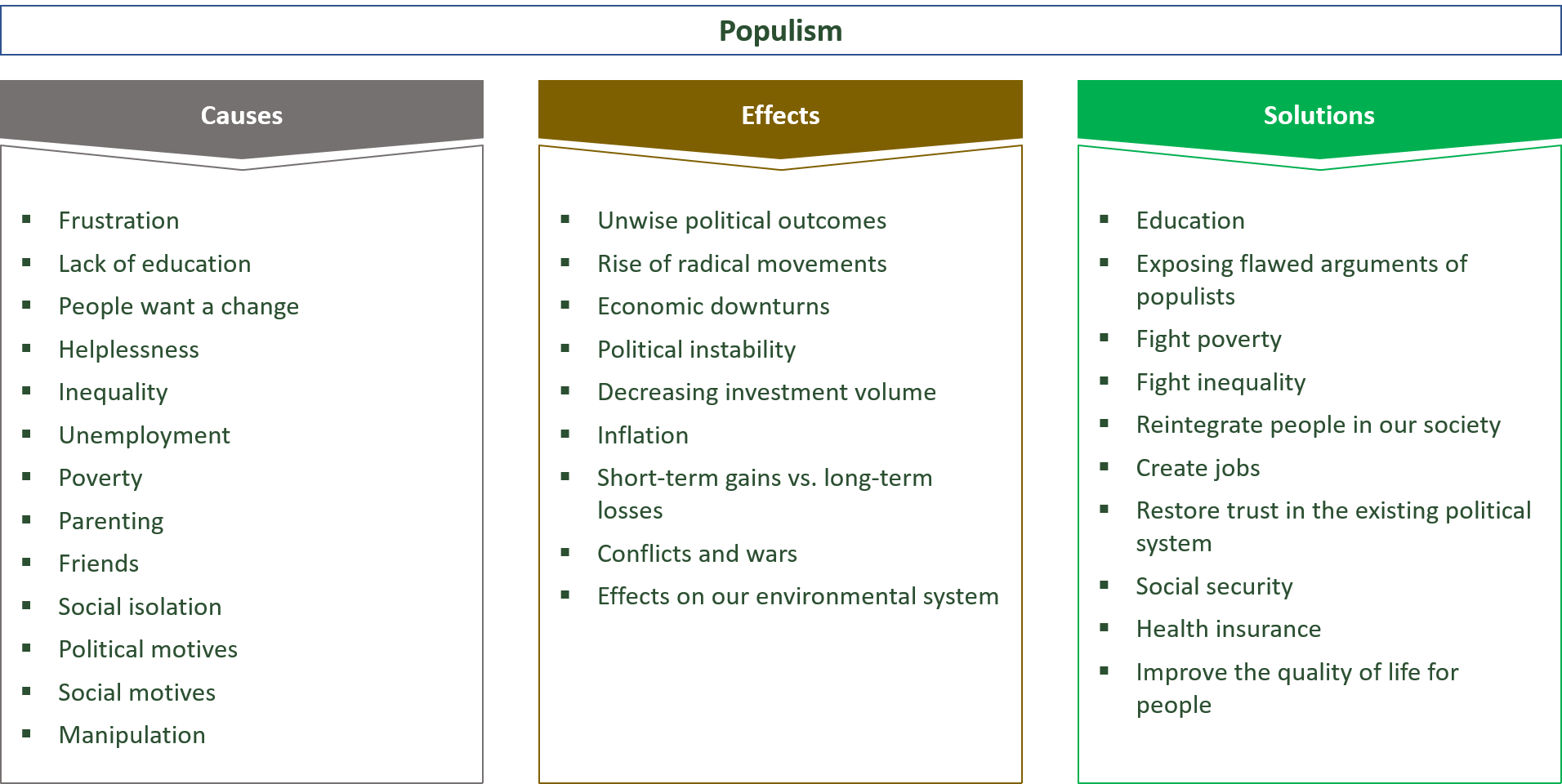“I’ve never really considered myself just a street artist. I consider myself a populist.”
Shepard Fairey, Artist
Populism: Causes, Effects & Solutions

Populism can be defined as movements against a so-called elite.
In the philosophy of populists, they are placed on the morally “right” side while the elite is a kind of unwanted object that had to be fought somehow.
Populism can come in various forms, including political and financial topics.
In the extreme, populism can lead to serious adverse effects in our society.
In this article, the causes, effects and solutions for populism are examined.
Audio Lesson
Contents
Causes for Populism
- Frustration
- Lack of education
- People want a change
- Helplessness
- Inequality
- Unemployment
- Poverty
- Parenting
- Friends
- Social isolation
- Political motives
- Social motives
- Manipulation
Frustration
Frustration can be a big factor when it comes to the development of populist movements.
Many people are just not happy with their lives and hope to be better off if the political or social framework changes in their favor.
Thus, these people are often eager to support populists since they feel they have not too much to lose and a lot to gain from these movements.
Lack of education
A lack of education is another big cause of the rise of populist movements.
The less educated people are, the easier they are to convince to join populist movements since these people may not be able to identify the arguments of populists as flawed.
These people are likely to believe in the arguments made by populists since they just sound logical to them.
Moreover, a lack of education also indirectly contributes to the rise of populists since it also often implies a higher chance of unemployment, which in turn leads to frustration and enhances the incentive to join populist groups.
People want a change
Many people, especially those who suffered a lot in the past from economic or other issues often just want to see a change in the political framework and are therefore willing to join radical movements in order to accomplish their goals.
These people may want a better future for their children and may therefore be willing to fight for it, even if this means going against the existing framework.
Helplessness
Some people may also feel quite helpless in their daily life due to financial or private issues.
These people often feel that the government does not take measures to sufficiently support them and may therefore become frustrated, which may translate into joining populist movements that promise them to support them and to provide a better future.
Inequality
Inequality is a big worldwide issue that leads to many adverse consequences.
It also works in the favor of populists since inequality leads to frustration of people.
People are often envious and want the same material status as their family members or friends.
Thus, if they are not able to accomplish this status, chances are that people become unhappy, frustrated and therefore willing to join populist movements since they hope to grow their social and financial status due to that.
Unemployment
Unemployment may also lead to the rise of populist movements, especially in regions which are quite poor and have a quite low living standard.
If people in these regions become unemployed, they may no longer be able to provide for their families and may suffer from starvation.
In order to prevent this, people may be willing to support populists since they just out of pure desperation since they urgently need a change to survive.
Poverty
The lower the quality of life of people, the more willing they are to join radical movements since these people urgently want a better life and are therefore willing to fight for it.
Especially in developing countries, parents are often not able to provide for their children, to send them to school and so on due to poverty.
For these people, the promises of populists may seem quite attractive.
Thus, these people are likely to fall for populist arguments sooner or later since they want a better future for their children.
Parenting
Parenting also plays a big role when it comes to the development of populist ideas.
If your parents joined a radical movement, chances are that you will yourself end up in these groups since you are greatly influenced by your parents.
If you grow up in an environment which supports radical thinking, you are at great risk of also becoming a populist and to support radical ideas, even if these ideas often do not make sense at all.
Friends
Your circle of friends may also play a crucial role when it comes to joining populists.
Especially when you are young, you might be easy to influence by other people since you have not developed your own character to be strong enough to refrain from pack behavior yet.
Thus, at this young age, if your friends are joining radical movements, chances are that you also take part in populism activities since you may feel obligated to support your friends.
Social isolation
Social isolation may also play a big role in the development of populist movements.
Isolated people are often easy to influence since they are often seeking the approval of others due to a lack of real friends.
If populists give these people the opportunity to join their movement and to make new friends in their organization, chances are that socially isolated people take this opportunity.
Political motives
Some people also just want a radical political change since they are quite disappointed with past political decisions.
These people usually do not care too much about what populism might lead to, but just want a different government since they feel this is the only way to go in order to improve their quality of life.
Social motives
Many people, especially in poor developing countries, often have no health insurance and no social security.
These people are at great risk for extreme poverty and for several severe health issues since they will not be able to pay for hospital treatment once they get sick.
If populist movements promise these people proper health insurance and social security, chances are that people may buy in since they just hope to have better government support in the future.
Manipulation
Populist movements are often built on the manipulation of people.
Many people are just not able to see that most arguments made by populists are often flawed.
Therefore, these people are easy to manipulate and may join populist movements since they are just not scrutinizing the arguments of populism enough to see the weaknesses in their argumentation.

Effects of Populism
- Unwise political outcomes
- Rise of radical movements
- Economic downturns
- Political instability
- Decreasing investment volume
- Inflation
- Short-term gains vs. long-term losses
- Conflicts
- Effects on our environmental system
Unwise political outcomes
Even though populists often promise to make politics that improve the quality of life for the majority of people, the outcome is often the reverse.
People are often worse off if populist movements gain power compared to the former administration.
This is due to the fact that populists often act opportunistically.
Populists may promise many positive things in order to gain power, but once they have power, they are mainly concerned to sustain their power and execute in their best interest, even if these interests contradict with public interests.
Therefore, populism may lead to unwise political outcomes.
Rise of radical movements
Populism is often connected to radicalism.
Since populist movements are meant to go against the current leaders of the system, radical movements often see a chance to join these populists and to make a political impact in a radical direction, either on the left or on the right wing.
This can lead to severe issues regarding voting outcomes.
If populists become too strong, they may be able to have huge political influence and may lead their country in a radical direction.
Economic downturns
Since the promises of populists are often just not sustainable, populist movements may be responsible for significant economic downturns.
For instance, if populist movements gain power, multinational companies may lose the interest to produce in these countries since they fear being expropriated and therefore will close their branches in these regions which may in turn lead to a severe economic downturn since many jobs will be lost.
Political instability
Populism may also lead to political instability.
Depending on the degree of political power that populists are able to gain, they may be able to vote against all the things which in their eyes are not in line with their populistic beliefs.
By doing so, many propositions may be blocked and the political framework may become quite fragile.
Decreasing investment volume
Political and social instability due to populist movements will also often lead to a decrease in overall investment volume in these countries.
Investors will be afraid to invest their money in these countries since they have to fear expropriation or other issues that would impact their profit margins.
Thus, these investors will search for alternative investments in politically stable regions instead.
Inflation
Another consequence of political instability due to populism is a high inflation rate.
If people lose trust in their government, chances are that also the currency will depreciate drastically.
This is due to the fact that money only has value if people believe in it.
If people stop believing in their currency, no shop will be accepting the payment with the local currency and the currency itself will become worthless.
Moreover, people in these unstable countries will often strive to exchange their money into stable currencies like EUR or USD, which will lead to further depreciation of their local currency.
Short-term gains vs. long-term losses
Some political decisions of populists may even have short-term gains for the local population.
However, since these short-term gains have to be financed somehow, there may be severe financial issues to these gains in the long run.
Hence, although some people may currently benefit from financial subsidies, the next generations may suffer since they have to pay back the debt related to these subsidies.
Conflicts
If populist movements are quite radical and willing to apply physical damage to people in order to accomplish their ideologies, this may increase the probability of conflicts, which may in turn translate into horrible outcomes for the local population.
Effects on our environmental system
Populism may also have severe consequences for our environmental system.
For instance, many populist movements deny climate change.
These populists may therefore refrain from making commitments that aim to reduce our greenhouse gas emissions since they do not care about the global warming issue at all.
This can have horrible effects on our environmental system as a whole, especially since this could start chain reactions when other countries also do not care about the reduction of greenhouse gases anymore.

Solutions for Populism
- Education
- Exposing flawed arguments of populists
- Fight poverty
- Fight inequality
- Reintegrate people in our society
- Create jobs
- Restore trust in the existing political system
- Social security
- Health insurance
- Improve the quality of life for the local population
Education
Education is key when it comes to fighting populism. It is crucial that people understand that many promises from populists are actually flawed and will not be sustainable in the long run.
The more educated people are, the higher the chance that these people may have a realistic picture of reality.
These educated people may therefore less likely to fall for the flawed arguments of populists and may rather vote for a stable government instead of radical populistic movements.
Exposing flawed arguments of populists
It is also crucial that we expose the flawed arguments of populists in public.
We have to raise awareness of people who are currently believing in these flawed arguments and have to convince them that these arguments do not withstand rational analysis.
By doing so, we might be able to convince people who bought into ideologies that it may be a better idea to vote for stable political frameworks instead of supporting populism.
Fight poverty
In order to mitigate the problem of populism, it is crucial to fight poverty.
Poverty and populist movements are linked since poor people are seeking desperately for a better life and are therefore easy to manipulate by populists.
Thus, we have to take measures to improve the level of wealth of people in poor countries so that the incentive to vote for populist movements decreases.
Fight inequality
Since inequality often leads to frustration and envy, it is a big cause for the rise of populism since people who are on the lower end of the wealth pyramid will strive to increase their financial and social status.
Many of these people want to increase their status so badly that they are willing to support populist movements in order to reach their goals.
Thus, it is crucial that governments take action to lower the level of inequality.
For instance, this could come in the form of financial support for the education of kids so that these kids may be able to get a good job and get out of poverty.
Reintegrate people in our society
Some people feel not to be a valuable member of society.
These people often isolate themselves since they are afraid to go outside and meet new people due to bad past experiences.
These kinds of people are at great risk to be manipulated by populists if these populists integrate them into their social circle.
By doing so, formerly isolated people may now feel useful and may therefore engage in populist movements, even though they might not really believe in them just to sustain their connections.
Create jobs
It is also crucial that municipalities try to create jobs, especially in regions that show a high unemployment rate.
Since unemployment can lead to significant frustration for the local population, this frustration may turn into radical movements.
In order to prevent the rise of populists due to unemployment, there should be efforts to create jobs.
For instance, this could come in the form of government subsidies or tax advantages for companies to give them incentives to open branches in these regions.
Restore trust in the existing political system
Since many people have lost trust in politicians due to bad past experiences, it is also crucial to restore trust in order to avoid populist movements.
Many people who are joining populists do not actually think that these populist ideas are valid, yet they also do not trust the current political system and are desperate for a change.
Therefore, it is crucial to restoring the trust of the local population so that the incentive to vote for populists decreases.
For example, this could come in the form of community talks where the local population can engage in discussions with politicians.
Social security
Especially for poor countries that currently lack social security schemes, it is crucial to introduce these schemes in order to protect the local population from poverty.
If people do not have social security and they become unemployed, they may lose the ability to pay for rent or to buy food.
Thus, these people may suffer from a high level of desperation which may lead them to vote for populists.
Therefore, governments should introduce sufficient social security so that people will be able to buy things for their daily life and do not fall into a state of desperation.
Health insurance
Proper health insurance is also crucial to reduce the popularity of radical movements.
Since many populists will promise people health insurance and other benefits, it is quite tempting for the local population to fall for these promises since they urgently strive for health insurance in order to be protected in case of severe health issues.
Thus, it is important that governments around the world provide sufficient health insurance, especially for poor people, so that the incentive to vote for populist movements decreases.
Improve the quality of life for the local population
Since populism is strongest in regions where the quality of life is quite low and people desperately want to see a change, governments have to improve the quality of life of people.
The higher the quality of life, the less likely people are to vote for populists since they are quite happy with their life and do not want a change in the political system anymore.
Conclusion
Populism is a big global problem, especially in poor countries with unstable political and financial conditions.
In these countries, it is crucial that governments fight populism by increasing the well-being of the local population.
This could be accomplished by several measures which have been shown before.
By doing so, the incentive for people to join or vote for radical populist movements can be decreased significantly.
Sources
https://en.wikipedia.org/wiki/Populism
https://www.ifo.de/en/topics/populism

About the author
My name is Andreas and my mission is to educate people of all ages about our environmental problems and how everyone can make a contribution to mitigate these issues.
As I went to university and got my Master’s degree in Economics, I did plenty of research in the field of Development Economics.
After finishing university, I traveled around the world. From this time on, I wanted to make a contribution to ensure a livable future for the next generations in every part of our beautiful planet.
Wanna make a contribution to save our environment? Share it!